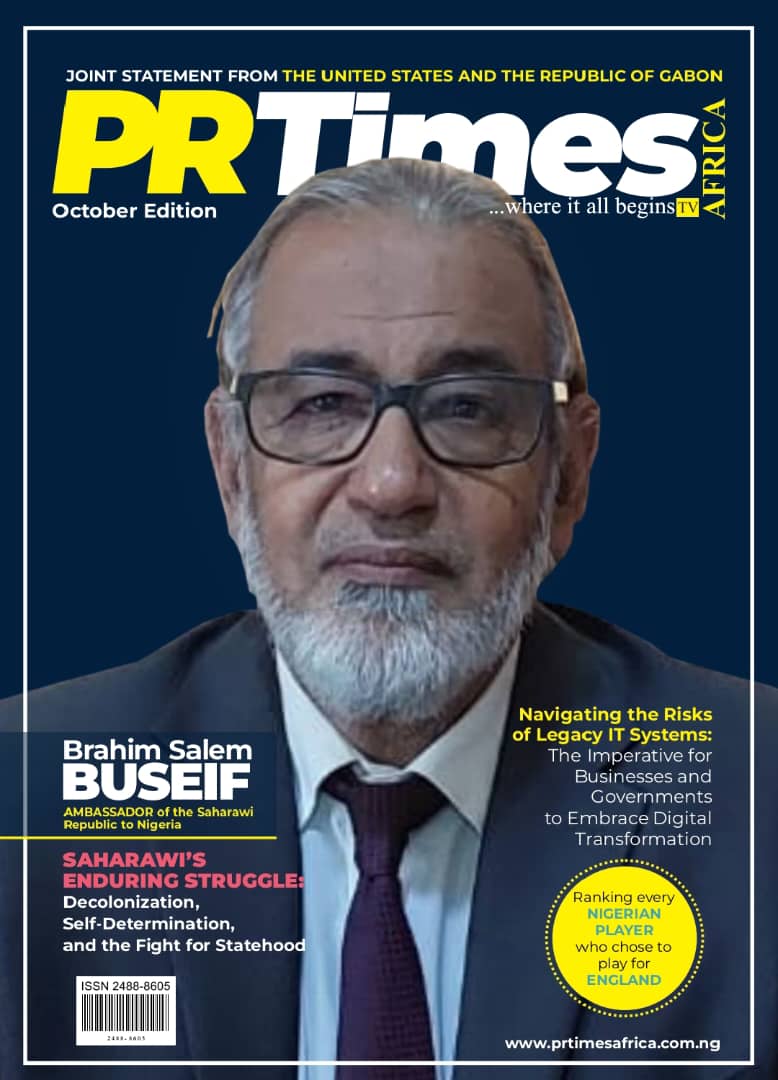Saharawi’s Enduring Struggle: Decolonization, Self-Determination, and the Fight for Statehood
Interview Questions for the Saharawi Ambassador to Nigeria
- Historical Background
- Can you briefly explain the origins of the Saharawi struggle for independence and how Spanish colonial rule affected the course of decolonization?
First, it is worth signaling that Spain did not conquer the territory by force. After failing in several attempts, the Spanish authorities negotiated an agreement with some chiefs of tribes by which Spain was allowed to establish fishing and military locations along the cost. After becoming stronger military, they managed to invade the whole Western Sahara, although the resistance didn’t end till the year 1934.Like most African peoples-when the United Nations recognized the right of colonized countries and peoples to self determination and independence-the Saharawi in 1967 founded the Movement for the Liberation of Western Sahara and, peaceful through demonstrations started to demand the end of the colonial rule. In June 17, 1970 a big demonstration of the Movement in our capital city of El-Aaiun was confronted by the colonial military forces with fierce violence using live ammunition and undertaking a massacre were many died and the founding leader of the Movement, Sid Brahim Bassiri, was abducted and since counted as disappeared.
As a consequence of the said repression in 1970, Saharawi patriots-including many members of the Movement for the Liberation-founded the Frente Popular para la Liberación de Saguia El Hamra y Rio de Oro, the POLISARIO FRONT and declared the armed struggle against Spanish colonial presence.
In 1975, the leader of the POLISARIO FRONT, Luali Mustapha Sayed, in direct negotiations with the then Spanish minister of Foreign Affairs, Cortina Mauri, reached an agreement for the swap of prisoners of war of both sides and the development appeared to be heading towards a process of decolonization, moreover the Spanish government was secretly negotiating the infamous Madrid Accords with Morocco and Mauritania.
- The Madrid Accords
- How did the 1975 Madrid Accords, where Spain handed over Western Sahara to Morocco and Mauritania, affect the Saharawi people and the fight for self-determination?
Despite the International Court of Justice, which in 1975 clearly ruled that “there were no links of sovereignty between Western Sahara and the Kingdom of Morocco and Mauritania before the Spanish colonialism” and, in spite of the report of the United Nations Visiting Mission-which in June, 1975 came to the territory-where it was clearly stated that: the POLISARIO FRONNT was the only political force represented in the whole territory and that everyone they interviewed was against the territorial claims of Morocco and Mauritania and expressed their willingness to be an independent country, the Spanish government reneged its commitment to the United Nations to fulfill its obligations as the colonial power and handed the territory to the invading countries Morocco from the north
and Mauritania from the south.
It goes without saying that this treason and betrayal created a very difficult and dire situation where the Saharawi people had to confront two armies of occupation.
Entire families, women, children and the elderly fled, in an exodus in the desert, towards a safe haven in Algeria from the napalm and white phosphorus bombings of the war planes of the Moroccan army.
The Madrid Tripartite Accords constituted a blatant violation of International Law and as such were condemned by the Security Council and the General Assembly of the United Nations. Morocco is an occupying state that continues to systematically undertake abuses of human rights in Western Sahara.
- Current Relations with Mauritania
- Mauritania relinquished its claims over Western Sahara in 1979 and you now have good relations. Can you tell us about how this transition occurred and the current state of diplomatic relations?
Since the very beginning, the war against the Saharawi people was unpopular in Mauritania and the majority was against it, there are strong cultural and brotherhood bonds between us and Mauritania, both peoples speak the same dialect of Arabic, the Hassania.
Mauritania’s army, besides being weak at that time, was not motivated. The POLISARIO successfully managed to transfer the war to the territory of Mauritania itself, through guerrilla warfare, attacking the train that transports minerals to the Atlantic-the main vein of the Mauritanian economy-and, also attacked twice, its capital city Nouakchott.
During the war with Mauritania, the French army intervened against our army with their Jaguar war planes coming from a military base in Senegal.
In July 1978 there was a coup d’état and, since then, fraternal and good neighborly relations have been reestablished.
- The Conflict with Morocco
- What are the key points of contention between the Saharawi people and Morocco, and how has this conflict shaped the region’s political landscape?
There is no doubt whatsoever regarding the nature of the Moroccan presence in Western Sahara: it is illegal occupation as it is reaffirmed by UN resolutions, the International Court of Justice, the European Court. Such occupation hinders and impedes the integration and development of the Maghreb. The North African region the UMA is the only non-functioning regional organization of the African Union. There will be no peace, no stability while parts of the Saharawi Republic remain under Moroccan occupation.
- The Role of the African Union
- How has the African Union supported the Saharawi people in their quest for independence, and what further steps do you believe African nations should take to aid your cause?
Both the Organization of the African Unity (OAU) before, and now the African Union (AU) have been consistent with the principles, respectively, enshrined in their Charter and Constitutive Act where the Africans, wisely, underscored the obligation to respect the frontiers inherited from the colonial era as the only way to avoid chaos and in order to preserve peace and stability among peoples and countries in Africa.
Accordingly, when the Sahrawi people proclaimed the Sahrawi Republic, upon the withdrawal of the colonial power, it was recognized by the OAU becoming afterwards a founding member of the AU. When our Republic was admitted to the OAU, the late King Hassan of Morocco left the organization, contemptuously describing its summits as “drum ceremonies (tam tam).” moreover, in 2017, they applied for AU membership and were admitted. They are supposed to respect the Constitutive Act of the African Union which they signed.
The AU should force Morocco to respect the rules and regulations of the continental organization, particularly articles 3 and 4 of the Constitutive Act, relating to the respect for borders and the non-use of force to occupy territories.
We are convinced that the Moroccan government has come to the AU, as a Trojan horse for foreign interests, with the aim of destroying the African Unity.
- The United Nations and Self-Determination
- The United Nations has called for a referendum on self determination for Western Sahara. What are the main challenges in realizing this, and what more can the international community do to facilitate it?
The UN intended to hold a referendum on self-determination for the Saharawi people since 1974.
Morocco fears the free expression of the Saharawi people, because they know that the Saharawi will choose to be independent, that is why they are continuously putting obstacles to the referendum. First, in 1975 to delay it, they requested the General Assembly to refer the issue to the International Court of Justice for an advisory opinion, but seeing that this tactics has backfired against them-given that the ICJ ruled that there is no reason to prevent the right of self-determination in view of the fact that the Court didn’t find any link of sovereignty between Western Sahara and Morocco-they bought the complicity of Spain and invaded the territory militarily.
The Settlement Plan, brokered by the UN and the OAU in August 1988, agreed upon and signed by the POLISARIO FRONT and Morocco, and adopted by the Security Council in its resolutions 658 (1990) and 690 (1991), remains being the only way for reaching a lasting solution to the conflict. The said plan, provides for the holding of the self-determination referendum, the Moroccan government, attempting to rig and change the result of the plebiscite, brought thousands of Moroccan settlers presenting them as “Saharawis” to the joint UN-OAU identification Commission, and when the Commission in 1999 denied them the right to be legible voters for not fulfilling the required criteria, Morocco reneged its commitment and now is refusing the celebration of the referendum.
Morocco spares no efforts trying to circumventing and ignoring the legal aspect of the conflict, blackmailing and bribing, everywhere, in an attempt to impose the fait accompli of its illegal occupation.
- Life in Exile
- Many Saharawi live in refugee camps and have been displaced for decades. What is life like for these communities, and how are they maintaining hope for a free and recognized Saharawi state?
From the very beginning, taken into account that we’re outnumbered by the enemy, the
POLISARIO FRONT didn’t deceive the people promising a quick victory, on the contrary,
our narrative has always consisted in reiterating that the Liberation Struggle will be long, a
struggle to be inherited and continued for generations. Hence, our people continue to show an admirable degree of resistance to the occupation despite very adverse conditions, maintaining high morale and never losing hope.
- The Importance of Decolonization -You’ve described the Saharawi struggle as an issue of decolonization. Could you explain why this framing is important, and what lessons other African nations can take from your experience?
After the Declaration on the Granting of independence to colonial countries and peoples by the General Assembly (1960), and since the early sixties of the last century to date, the question of Western Sahara has been, naturally, inscribed in the agenda of the Decolonization Committee. Indeed, it is important to always keep in mind that it is a decolonization problem which must be settled according to the United Nations doctrine, the above mentioned Declaration, Resolution 1514 (1960)
- Support from Nigeria
- How has Nigeria supported the Saharawi people over the years, and what role do you believe Nigeria can play in advancing the Saharawi cause on the international stage?
The support of Nigeria to the Liberation Movements in Africa was crucial. No wonder, Nigeria is the backbone of Africa, and it is fair and normal that it has the leadership role and responsibility to ensure democracy and respect for the laws and principles of the African Union. Likewise, the solidarity and support of Nigeria with our just cause is very important, and we highly value and appreciate it. Anyway, all we are asking from our friends, precisely, is to enforce justice by implementing International Law, and the obligation for every country to abide by what is agreed upon fulfilling its commitments.
- Vision for the Future
- What is your vision for a future Saharawi state, and what steps need to be taken to achieve lasting peace and independence?
We are convinced that, sooner than later, justice will prevail. Morocco will come to realize that its dream of a fictitious empire is not feasible, that it is impossible to extinguish the flames of the Saharawi resistance to occupation and, at the end, they will accept the rules of International Law.
Otherwise, it means prolonging the suffering of the Saharawi and Moroccan peoples and delaying the development and regional integration of North Africa.
The so called Moroccan initiative of autonomy is a neocolonial stratagem elaborated by a European country, specialized in neocolonialist policies, aimed at perpetuating the occupation. Any solution which does not provide for the self-determination of the Saharawi people is doomed to failure.
In Conclusion
On October 4, the European Court of Justice declared void the trade agreements between Morocco and the European Union that include the occupied territory of the Sahrawi Republic.
This historic ruling constitutes a resounding victory for the Sahrawi people and a humiliating setback for Moroccan expansionist policy because, in addition to annulling the agreements through which Morocco looted our natural resources, it also reaffirms that:
- Morocco does not have sovereignty over Western Sahara and recalls the ruling of the International Court of Justice of 1975, – Western Sahara is a distinct and separate territory from Morocco,
- The Polisario Front is the legitimate representative of the Sahrawi people,
- Morocco is an occupying force in Western Sahara,
- The right of the Sahrawi people to self-determination and independence is inalienable.
Likewise, the said verdict is a hard blow for those in Europe who try to whitewash the Moroccan attempt to evade international law, that is, the so-called autonomy, calling it “serious and credible!”



